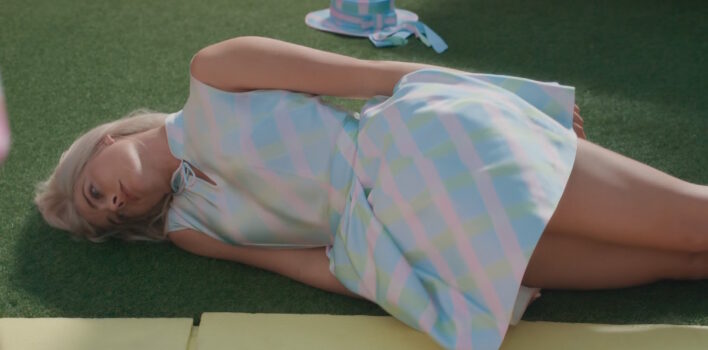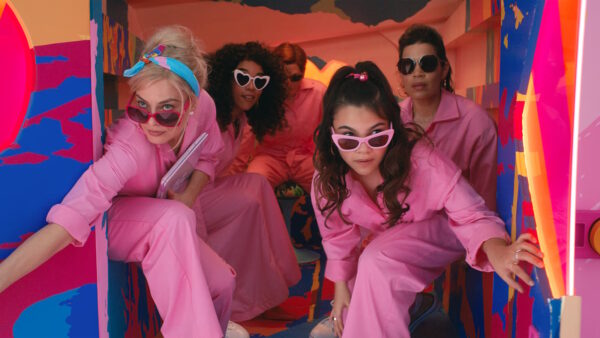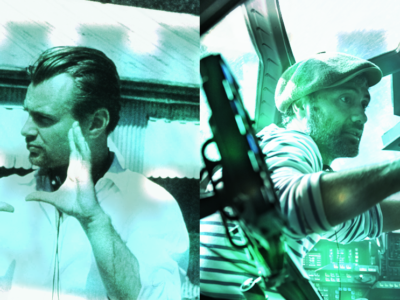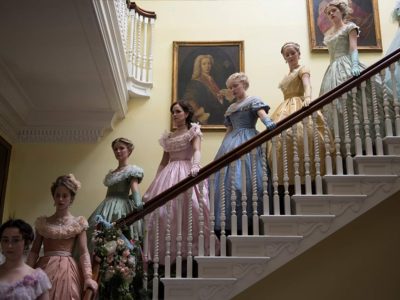The Chief End of (Wo)man – Barbie (2023)
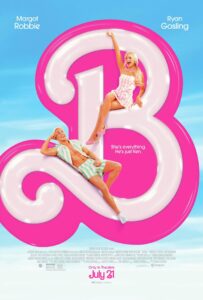 Barbie is the movie for millennial women. It’s funny, thoughtful, and visually beautiful, but most of all it’s made by us, for us, and is telling our story in a way that, based on box office revenues, clearly resonates. Barbie’s awakening journey mirrors our own; from upbeat optimism in an idyllic world to resolute determination in the face of emerging problems to utter overwhelm at the sheer magnitude of the brokenness in the world—and we didn’t even get to ride a snowmobile or roller blades to get there.
Barbie is the movie for millennial women. It’s funny, thoughtful, and visually beautiful, but most of all it’s made by us, for us, and is telling our story in a way that, based on box office revenues, clearly resonates. Barbie’s awakening journey mirrors our own; from upbeat optimism in an idyllic world to resolute determination in the face of emerging problems to utter overwhelm at the sheer magnitude of the brokenness in the world—and we didn’t even get to ride a snowmobile or roller blades to get there.
I don’t think I would have credited Barbie, but I do remember as a girl feeling like the issues of feminism were largely resolved. Thanks so much to all those women of the past who fought hard so I could vote, own property, not be property, and run a major corporation if I wanted to; so we’re all good and equal now, right?
While I was growing up, I started to recognize that things weren’t so rosy. But I’m a millennial; brought up on stories of plucky heroines with wands or archery skills overthrowing corrupt systems and solving complex dilemmas, we were raised with the certainty that the world was ours for the shaping. We’d fix it all, and by the end of the story everything would fall into place as the nice, perfect, technicolor dream world we thought we had been born into.
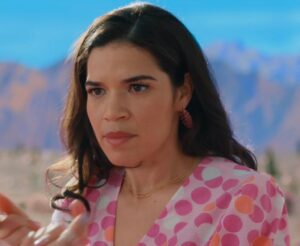 It was only as I grew up to be an actual woman that it became clear that it’s not that simple. That sparkly promise that “you can be anything” came with a sharp backhand of “you have to be everything.” You have to maintain a career and a home and an appearance that are all impressive and immaculate. You are required to do it all without showing weakness or flaws or mediocrity. As America Ferrera put so beautifully in her climactic monologue, “It is literally impossible to be a woman…we have to always be extraordinary, but somehow we’re always doing it wrong.”
It was only as I grew up to be an actual woman that it became clear that it’s not that simple. That sparkly promise that “you can be anything” came with a sharp backhand of “you have to be everything.” You have to maintain a career and a home and an appearance that are all impressive and immaculate. You are required to do it all without showing weakness or flaws or mediocrity. As America Ferrera put so beautifully in her climactic monologue, “It is literally impossible to be a woman…we have to always be extraordinary, but somehow we’re always doing it wrong.”
The pressure of such unrelenting standards is crushing. So the true beauty of this movie is when Barbie is trying to figure out what to do now that her former life no longer seems satisfying. She dares to ask to be human and Ruth tells her she doesn’t need permission.
You mean, being human isn’t something I have to ask for? It’s just something I get to discover that I am?
It is my opinion that people who don’t like Barbie or don’t understand why someone would love this movie don’t know how many people, particularly women, need to hear this exact thing: you are allowed to be human. You have innate dignity and your value is not contingent on what you do or how you look. You are allowed to have weakness, flaws, and mediocrity.
In Christian theology, this is the concept of Imago Dei. All people are made in the image of God and have innate dignity and worth. Like Barbie, we are made to represent Another; but unlike Barbie, becoming more like Him doesn’t give us flat feet or cellulite. Instead, we become more empathetic, more wise, more loving, and over time more complete and perfect.
We all, with unveiled faces, are looking as in a mirror at the glory of the Lord and are being transformed into the same image from glory to glory; this is from the Lord who is the Spirit.
—2 Corinthians 3:18, CSB
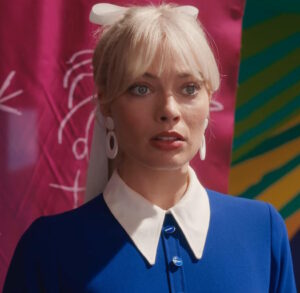 In Christ’s time on earth, he was radical for treating everyone he encountered with the same regard to their humanity. He had equal time and care for men and women, high-ranking officials and lepers, President Barbies and Allans. He came down to earth to give rest to the weary ones (who’ve been dancing all night) and to save us from our strivings (to be Barbie perfect).
In Christ’s time on earth, he was radical for treating everyone he encountered with the same regard to their humanity. He had equal time and care for men and women, high-ranking officials and lepers, President Barbies and Allans. He came down to earth to give rest to the weary ones (who’ve been dancing all night) and to save us from our strivings (to be Barbie perfect).
The Barbie movie asks the question, “What was I made for?” By her very nature, Ruth tells Barbie, she was designed to have many endings: doctor, race car driver, babysitter, astronaut. As many endings as there are little girls and days for them to play with Barbie. Humans, on the other hand, have only one ending; and most of us struggle to answer that question all our lives, burdened with the implication that we had better get it right the first time because there are no second chances. “What was I made for?”
Students of the Westminster Catechism will better recognize that question as “What is the chief end of man?”
“To glorify God and enjoy him forever.”
You don’t have to have all the endings; God just made you for joy. It is enough for you to exist. As a mom or a president or a mom who is president or as not a mom and not a president. You don’t have to have perfect hair or a dream house. You’re doing what you were made for. You are enough, as you are, however you are.


